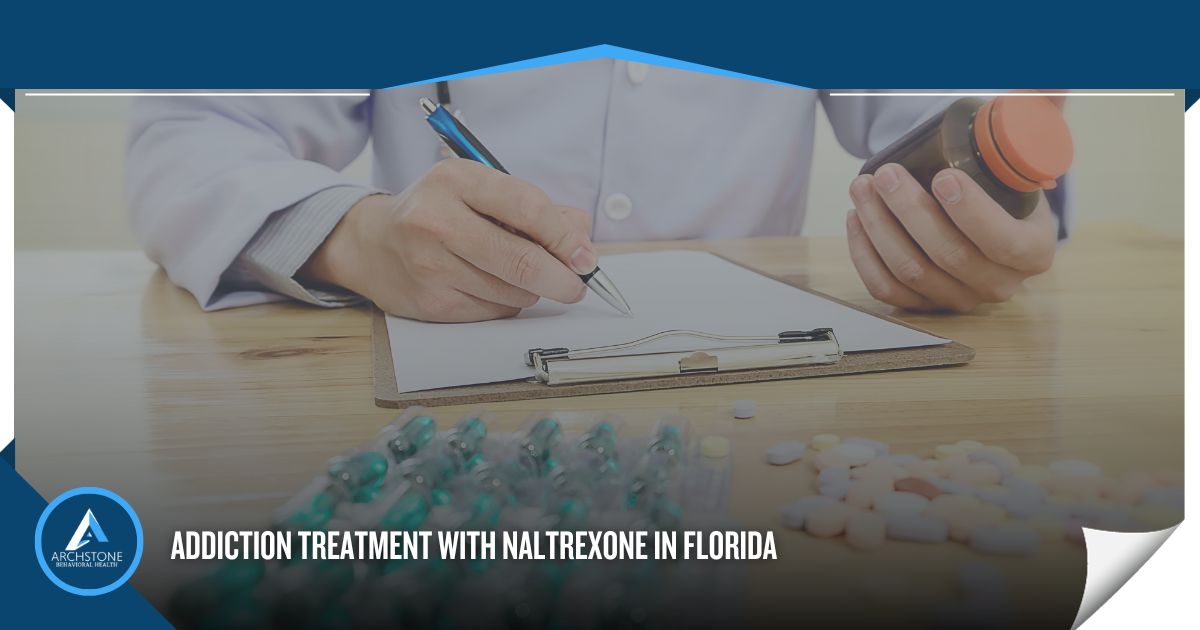Addiction Treatment with Naltrexone in Florida
Get Help Now

According to the Centers for Disease Control and Prevention (CDC), “More than 75% of drug overdose deaths in 2021 involved an opioid.”[1] Even further, the National Institute of Alcohol Abuse and Alcoholism (NIAAA) reports that 29.5 million people struggled with alcohol use disorder in 2021.[2]
Whether you struggle with opioid addiction or alcoholism, professional rehab is necessary. Because of how severe the opioid and alcohol problems are in America, addiction treatment experts have begun relying on more comprehensive approaches to recovery. One of the ways they have done this is by using a medication known as naltrexone.
Naltrexone is a prescription drug approved by the FDA to treat alcoholism and opioid use disorder by reducing cravings and preventing individuals from being able to get high on opioids or drunk from alcohol. As a result, their chances of relapse are reduced and they are better able to focus on recovery during addiction treatment. When naltrexone is used in addiction treatment centers in Florida, it is combined with traditional recovery methods like evidence-based therapies, group counseling, and relapse prevention planning.
What is Naltrexone?
Naltrexone is a prescription medication that is an opioid antagonist, which means it prevents substances from being able to attach to opioid receptors in the brain.[3] When you are taking naltrexone, you cannot experience a high from consuming opioids and alcohol.
Additionally, naltrexone binds to opioid receptors to prevent people from experiencing cravings that are extremely common during recovery from opioid and alcohol addiction.[3] By doing so, individuals have a higher capability to pay attention and participate in addiction treatment programs.
Naltrexone is prescribed under the brand names Vivitrol and ReVia. While Vivitrol is administered as a monthly intramuscular injection, ReVia is a pill that is taken orally every day. Both forms of naltrexone are effective in managing alcohol and opioid use disorders and they are not habit-forming.
Potential side effects of naltrexone include:
- Nausea
- Headache
- Dizziness
- Fatigue
- Anxiety
- Insomnia
- Joint or muscle pain
- Decreased appetite
- Abdominal cramps or pain
- Vomiting
- Diarrhea
- Constipation
- Increased thirst
- Irritability
How is Naltrexone Used in an Addiction Treatment Program in Florida?
Naltrexone is used as part of medication-assisted treatment (MAT) programs in Florida. Instead of using it as a standalone treatment for opioid and alcohol addiction, Florida rehab programs combine naltrexone with standard practices like individual therapy, group counseling, and relapse prevention planning.
It is important to note that naltrexone cannot be used until you overcome the withdrawal phase of recovery. For opioid addiction, you must wait 7 to 14 days to begin naltrexone.[3] If you are addicted to alcohol, you also have to wait until your withdrawal symptoms have subsided before starting naltrexone.
What are the Benefits of Using Naltrexone for Opioid Addiction and Alcoholism?
Naltrexone blocks opioid receptors to render opioids and alcohol ineffective, preventing you from being able to relapse. Additionally, it will reduce the amount of cravings you experience, as it retrains the brain to prevent it from associating alcohol or opioid abuse with pleasure. By doing so, your chances of relapsing are decreased substantially.
The benefits of naltrexone for opioid and alcohol addiction in Florida include:
- Blocking the pleasurable effects of opioids and alcohol
- Reducing cravings for alcohol and opioids
- Increasing mental clarity by reducing cravings
- Zero chance of developing a dependency or addiction to the medication
- Less chances of experiencing side effects than other types of medications for addiction
Since naltrexone reduces cravings, you will be able to fully focus on the individual therapy, group counseling, and relapse prevention methods you learn during addiction treatment in Florida. As a result, you will be able to create a solid foundation of recovery to rely on well after your treatment program has ended.
What Substances Should You Avoid While Taking Naltrexone?
Since naltrexone is an opioid antagonist, abusing opioids or alcohol while taking the medication can result in adverse effects. Drinking alcohol when you are on naltrexone could cause symptoms like nausea and vomiting.
When you are taking naltrexone, you should avoid consuming the following substances:
- Opioids like codeine or hydrocodone
- Alcohol
- Diarrhea medications
- Disulfiram
- Cough medicines
If you are going to begin a new medication after starting naltrexone, you should always consult with your doctor first. They can help you find a medication that does not have interactions with your naltrexone, ensuring that you do not experience adverse effects.
Learn More About Naltrexone Treatment in Florida
If you or a loved one struggles with alcohol or opioid addiction, naltrexone treatment might be right for you. At Archstone Behavioral Health, we believe in providing our patients with every resource available to arm them for success in their recovery. Our medication-assisted treatment (MAT) program combines counseling and behavioral therapy with the use of naltrexone to ensure you develop a strong foundation of recovery.
To learn more about addiction treatment with naltrexone in Florida, contact us today.
References:
- The Centers for Disease Control and Prevention (CDC): The Drug Overdose Epidemic: Behind the Numbers, Retrieved November 2023 From https://www.cdc.gov/opioids/data/index.html
- The National Institute for Alcohol Abuse and Alcoholism (NIAAA): Alcohol Use Disorder in the United States, Retrieved November 2023 From https://www.niaaa.nih.gov/alcohols-effects-health/alcohol-topics/alcohol-facts-and-statistics/alcohol-use-disorder-aud-united-states-age-groups-and-demographic-characteristics
- The Substance Abuse and Mental Health Services Administration (SAMHSA): What is Naltrexone, Retrieved November 2023 From https://www.samhsa.gov/medications-substance-use-disorders/medications-counseling-related-conditions/naltrexone